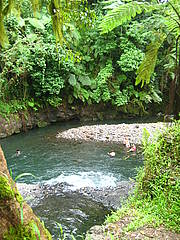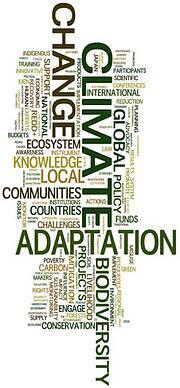Nature+ climate - Key messages from the IUCN Congress Forum
09 September 2012 | Article
Using ecosystems as nature-based buffers to reduce the impact of climate-related disasters
With increasing scope, scale and intensity of climate-related disasters, such as hurricanes/typhoons, cyclones, and droughts, there is growing recognition of the role ecosystems can play in reducing the impact of such disasters. Where ecosystems are resilient, environmental and socio-economic impacts are substantially reduced; ecosystems are more likely to sustain delivery of essential services.
Guidance is needed to promote sound ecosystem-based management; to communicate techniques to promote greater resilience of ecosystems.
Tools are needed for ecosystem managers to monitor the state of their ecosystems; to assess the risk to an ecosystem’s capacity to sustain delivery of needed services.
There is a need for research to assess the cost effectiveness of ecosystem-based solutions to climate change- UNEP is already considering this and funds are available.
Promoting solutions to environmental problems linked to climate change by drawing on skills of diverse disciplines
Solutions to complex problems related to climate change require cross-disciplinary skills that can effectively address a wide range of environmental and socioeconomic issues.
Synergies between professional expertise in biodiversity conservation, climate mitigation and adaptation strategies will lead to solutions that are more resilient to the dynamic conditions associated with climate change.
Leadership, as well as tools, are required to identify commonalities between different sectors and to demonstrate how environmental, economic and social sectors can work together through partnerships and networks to implement nature-based solutions.
An incentive structure is needed to encourage the private sector to invest in innovations that facilitate adaptation to the effects of climate change.
Strengthen nature-based livelihoods
In the context of climate change, sustainable livelihoods cannot be achieved without consideration of such fields as adaptation and mitigation, restoration, resource management, and conservation. Communities can play a key role in in addressing these areas as they are often reliant on natural resources for their livelihoods.
Applying an ecosystem approach that takes into account human/societal needs balanced with sustainable approaches to production could provide the critical link between these areas.
To achieve adaptation, mitigation and conservation goals, it is necessary to promote diversity in livelihoods in communities (such as through REDD+ initiatives) to reduce local dependence on primary carbon resources. REDD must use a decentralized approach focused on benefit sharing of natural resources as well as contribute to poverty reduction with clear proof while promoting techniques on sustainable agriculture away from shifting cultivation.
Community-based approaches to biodiversity management (such as forest management and locally managed marine areas) lead to more effective protection as well as achieve broader development goals.
Promote local solutions to adapt to climate change
Traditional knowledge, local experience, and community involvement in healthy ecosystems are successful, and cost effective, in providing ways to overcome the negative impacts of climate change, particularly disasters and their social impacts.
Local implementation and monitoring of environmental policies are the surest ways to enforce compliance with nature-based solutions to climate change.
REDD and REDD+ policies must focus on ensuring the rights of forest people, particularly those related to gender, local communities and equitable access to natural resources.
When linked, traditional knowledge, capacity building and technology clean lead to powerful nature-based solutions.





